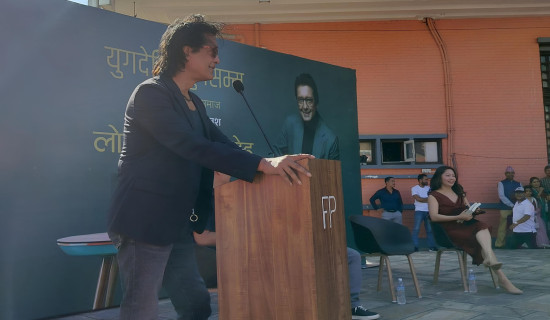- Sunday, 12 October 2025
Essence of Teej songs waning
By Santosh Subedi,Kaski, Aug. 14: In the past, Teej songs used to be about pain, sorrow, and women’s struggles, often mentioning jewelry and ornaments. They told the story of the whole year, the hardships, personal experiences, and important events, so listening to them used to bring back the real feeling of Teej. These songs were like a record of social and cultural life at that time.
But in recent years, things have changed. Many people said that ‘ratyauli’ songs (a type of light and suggestive songs sung during men's wedding) have taken over serious Teej songs.
Senior artists feel that the original style of Teej song has been lost.
They expressed that some songs have become too loose or indecent, making it awkward to enjoy with family. Instead of focusing on women’s real issues and social themes, many songs now talk about love and romance. They believe Teej should be celebrated creatively and meaningfully, not just as a chance to show off ornaments and luxury.
Folk music researcher Dr. Tulsi Pravas shared on social media, “Teej is almost here, but I have not heard a proper Teej song yet.”
He said most songs released during Teej season are not truly Teej songs but just regular folk songs. He terms these distortions’ and said the festival’s meaning should not be degraded. “Artists are the ones who protect art and culture. If they cannot tell the difference between culture and distortion, that’s wrong. Artists should keep each other in check,” he added.
Likewise, Prajapati Parajuli, former president of the National Folk and Duet Song Academy, also said that ratyauli has dominated Teej songs, ruining their real essence.
He said that Teej songs lost their real form and started to sound like ratyauli. When men began singing Teej songs in studios, it became fun for dancing, but he feels male participation does not suit the tradition except for songs that show conversations between fathers and daughters or between married women and their maternal families, which he says are beautiful parts of Teej. However, these should not turn into love stories.
He said that the Academy also warned the studio, so this time there were not so many controversial songs compared to last year.
He said Teej songs should keep their religious and historical connection, not focusing only on flashy videos.
Making a Teej song is expensive as one has to spend around Rs. 100,000 to 150,000 to record a song, and almost the same amount for its promotion. A Teej song’s popularity usually lasts only about a month. Even though the investment is hard to recover, some people still produce them for the sake of keeping the tradition alive.
Singer Jeevan Dahal said, “It is difficult to record a song and get the money back. It survives only through stage programmes, but we still record festival songs to preserve them.”




-square-thumb.jpg)











